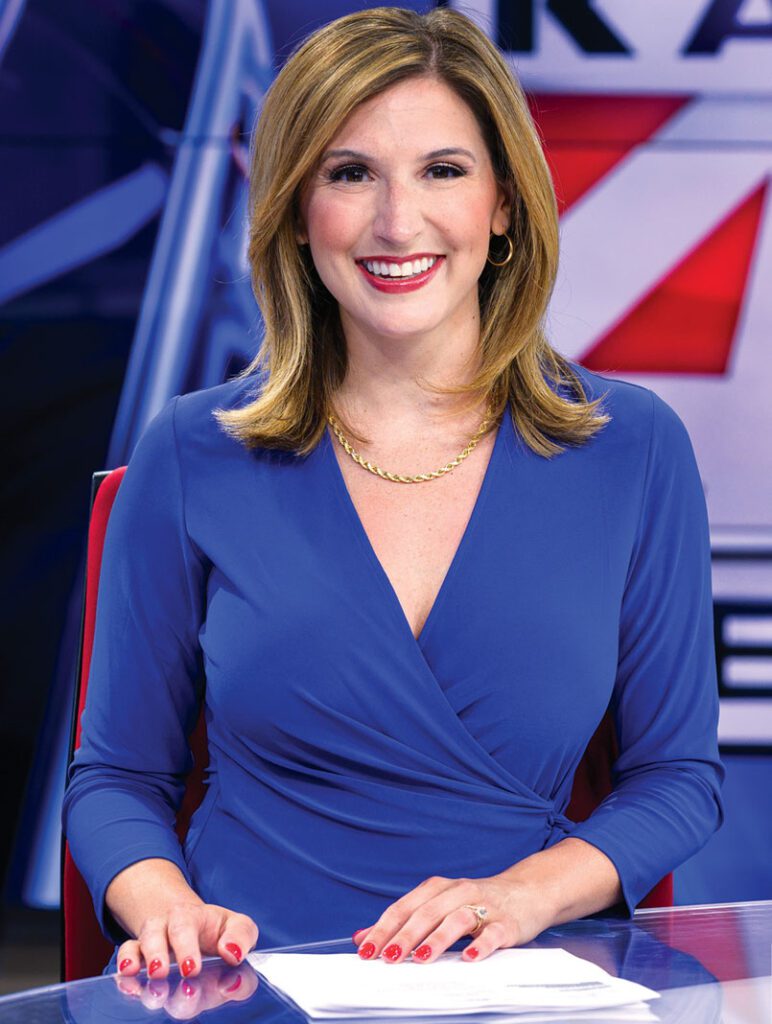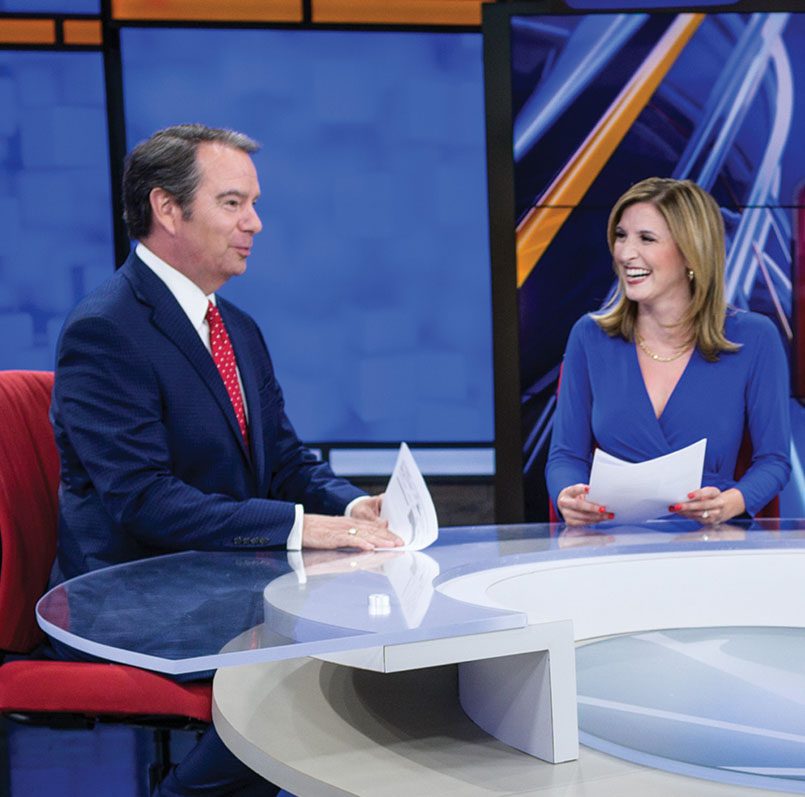01 May 2022 How Laura Monteverdi went from Florida native to Arkansas superstar
By Dwain Hebda
You couldn’t dislike Laura Monteverdi if you tried.
Fresh off vacation, the brassy KARK anchor has a catch in her voice from, she confesses, “too much fun,” the temporary rasp accentuating the New York-born elements of her speech. She laughs a lot, mainly at herself and at the path from her Florida hometown to the Midwest’s frozen tundra to emerald Little Rock.
“I think all my friends always knew, ‘Laura’s going to be on TV,’” she said. “They always said I had the anchor hair.”
The camera loves Monteverdi, who has real grit and brains behind the done-up persona, and just enough tomboy sass to suggest she’s equally at home at ball games as interviewing heads of state. In other words, she’s Arkansas’s kind of girl.

“I know that I’ve earned the trust of Arkansans after working here for seven years. I know if I say something, it has meaning behind it,” she said. “When people meet me, they say, ‘You’re the same person on TV as in real life.’ I say, ‘Well, you know, who else would I be?’”
The moment Laura Monteverdi was anointed to be a broadcaster varies according to who you ask. Her mother says it was in the womb when, at a loss for what to name her impending daughter, she heard a local newscaster name her baby Laura Elizabeth and was inspired to do the same.
Others in her large extended family point to her youth, when the precocious girl would stage elaborate TV newscasts, covering whatever stories were at hand.
“My stepdad had one of those big ol’ honkin’ video cameras, and my stepsister and I used it all the time for fun,” she said. “While other kids were playing outside, we were doing fake broadcasts in our room.
“In Florida you grow up with a lot of hurricanes so we would sit in my room, set up a desk. We’d wear my stepdad’s old blazers, have the coffee mugs and everything, and we would report on hurricanes. We’d go outside and do live reports in a Category 4, which at the time sounded fun. Right now it sounds very dangerous.”
At this she pauses to let her laughter subside.
“Those videos still exist,” she said. “They are highly embarrassing.”
Monteverdi herself said the galvanizing moment for her career came in college. After growing up on E! News, she entered the University of South Florida with an eye on entertainment reporting.
“Once I got into college, I realized the importance of actual journalism,” she said. “I transitioned from that E! News correspondent to actually wanting to tell stories that mattered.”
The nobility of her goals didn’t exempt Monteverdi from the same dues-paying by which all cub reporters are proven. Sioux Falls, S.D., her first job, was as rude an awakening as any self-described beach girl could have. Low pay, schlepping equipment from one farm report to the next and the vicious winters were a long way from the red carpet, but looking back she sees those years as instructive, from teaching her to treat mundane stories with professionalism to solidifying her confidence.
“Picking up my entire life and moving to South Dakota where I did not know a soul, I don’t think I was mentally prepared for that,” she said. “I’m alone in the middle of nowhere in a frozen tundra and I can’t afford soup for the week. I mean, I knew I wouldn’t get paid a lot, but that does something to your mental health. You’ve really got to tough it out.
“No one in my family or friends really agreed with my decision; they thought I was crazy. I can’t really explain it, but I just knew. I said, ‘Just trust me on this.’ I mean, I didn’t even trust me sometimes, and I questioned my decision a lot. But now I look back and I say, ‘See? I told you.’”
Monteverdi rose to morning anchor at her station but hated the winters so much she applied to other jobs, landing at THV in March 2015. Then, in September 2020, she was hired as the evening anchor for KARK, Little Rock’s NBC affiliate.
“I started applying for jobs because I was really cold and I needed to get out of there,” she said. “I wanted to go closer to a beach. Obviously, I had no idea where Little Rock was.”
She also had no idea the transformative event of her career and life was mere months away. In September, her boyfriend Brock Eidsness died from a heroin overdose, the shock of which drove her into a dual existence, with one face for the mirror and one for when the studio lights came on.

“I am a very private person. I keep a lot of my life private because we share so much about ourselves, especially when you’re an anchor,” she said. “[With Brock’s story] I couldn’t share it. I was frozen by fear of the stigma attached to drug addiction. It took me two and a half years just to tell people.
“I look back now, and that was a very sad time in my life because here I am on a morning show and I’m bright and bubbly and happy, but people had no idea what was really happening. I came across very easily on camera, but my personal life was destroying me.”
Monteverdi finally decided to channel her pain into helping others. “Saving a Generation: The New Face of Drug Addiction,” her Regional Emmy Award-winning documentary examining the opioid epidemic, was cathartic for herself and, judging by the fan mail, for others as well.
“I remember walking into my boss’s office saying, ‘I want to do this.’ I didn’t really know what that meant at the time, and I don’t think they did either,” she said. “I really wasn’t healing those first two and a half years. When you’re so alone and you’re not talking about it, it’s very hard to grieve. I worked on the documentary for six months, and those months were very long. Sometimes I just had to stop and not do it. It was a process for me, but it was a very healing process.”
Now newly engaged, life has come full circle for Monteverdi, who has one simple directive for anyone who thinks about affecting change on an issue important to them, be it combating drug abuse, saving animals or coaching Little League.
“Listen to that God Whisper,” she said. “I heard that whisper for a really long time, and it only got louder. I tried to ignore it, but it became overwhelming, in a good way, and I knew what I needed to do. There is a quote I absolutely love; it says, ‘Use your pain as a microphone.’ I have an actual microphone, but you don’t need one to do that. If you feel that calling in your heart, if you know it can help someone, then share it. There’s no reason you shouldn’t.
“I shared my story so many years ago, and I still do, because I still see it helping people. I do not like talking about myself, I really don’t. But if I know that it’s helping someone else then I’ll do it, no questions asked.”
- The pinnacle of success - June 1, 2025
- Five-Oh-Ones to Watch 2025: Aaron Farris - December 31, 2024
- Julia Gaffney brings medals and mettle home to Mayflower - October 30, 2024








